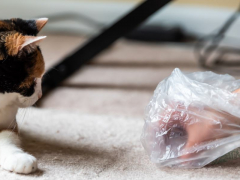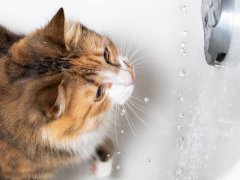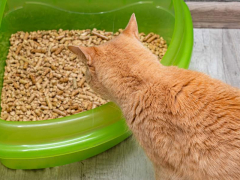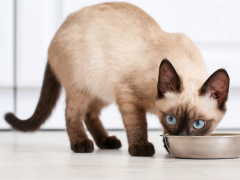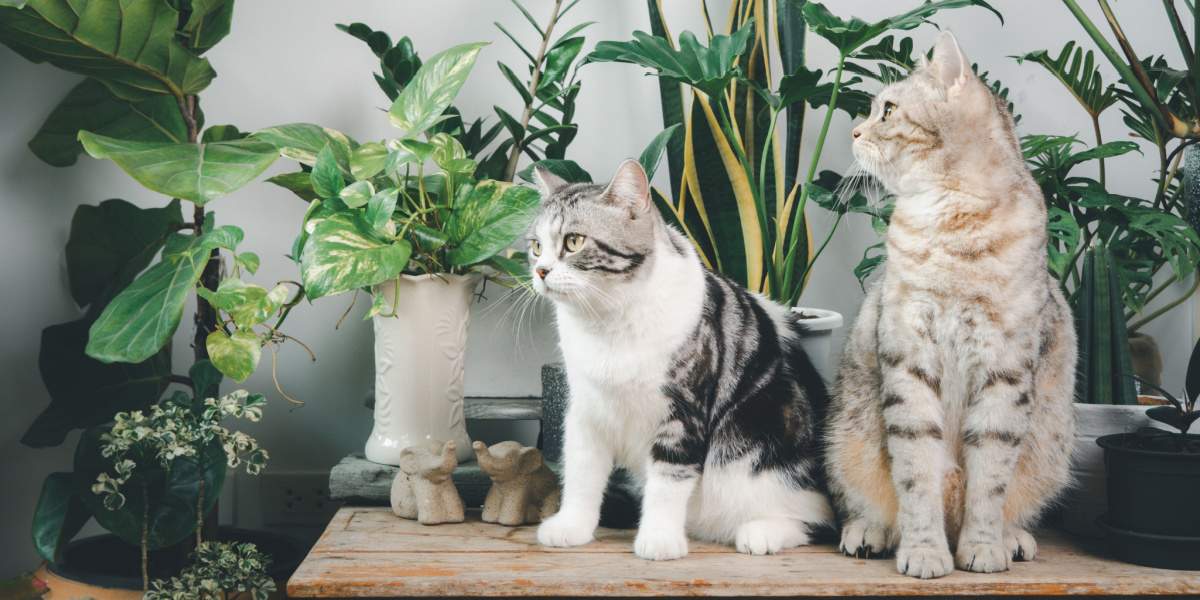
Cats often seem to have an affinity for plants. Whether it’s a beautiful birthday bouquet, an indoor pot, or some outdoor foliage, it will probably get your cat’s attention. So, why are cats so interested in plants? And how can you keep them away? Let’s find out.
What Attracts Cats To Plants?
Cats might be attracted to plants for the following reasons:
1. Smell
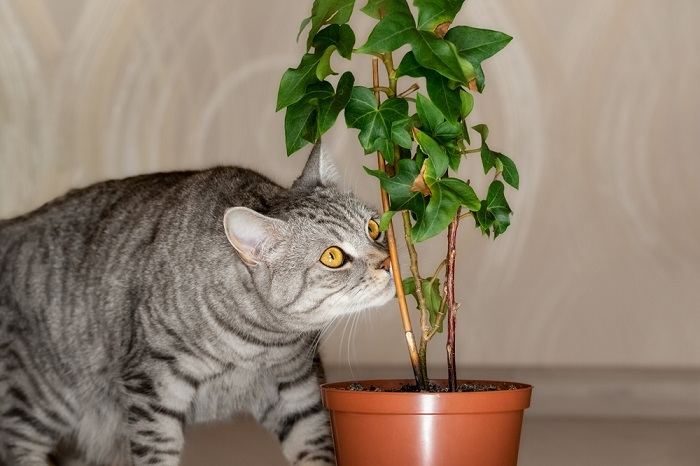
Cats are drawn to the smell of many plants and flowers.
It’s not just humans that can appreciate the smell of floral blooms. Cats have an excellent sense of smell, so they’ll certainly notice if a plant is particularly fragrant. However, the fragrance isn’t always an attractive feature for cats. Whether they’re an outdoor or indoor plant, if a plant’s smell is overpowering, it might actually put your cat off.
Also Read: How To Mask The Cat Smell In Your Home
2. Insects
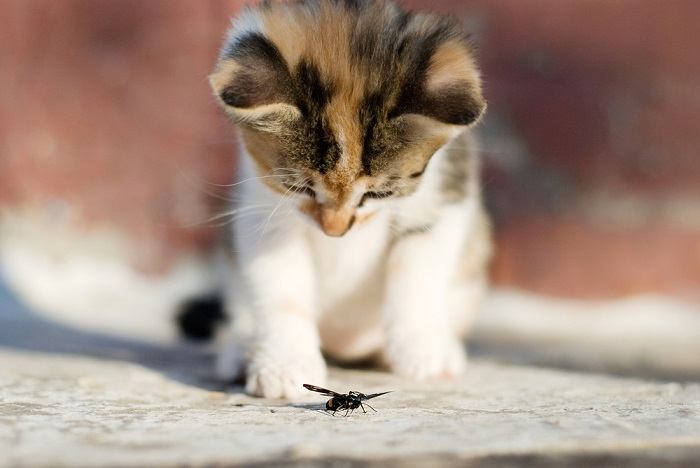
Cats may be more interested in the bugs in and around a plant than the plant itself.
Cats love to practice their hunting, and stalking insects is a perfect pastime for honing their skills. Since insects are attracted to flowers and plants, you might find your cat follows them. Of course, chasing and pouncing on insects isn’t the most sensible activity for your cat, since insect bites and stings can lead to pain, swelling, and allergic reactions.
Also Read: Insecticide Poisoning In Cats: Symptoms, Diagnosis & Treatment
3. Taste
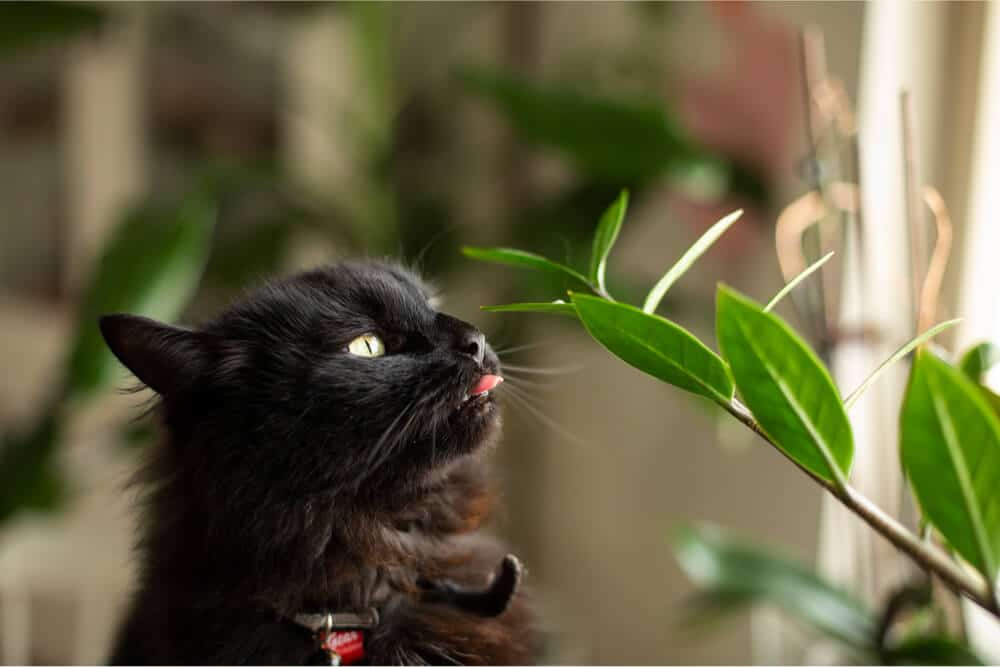
Cats often enjoy chewing on plants, but this can be dangerous for them if the plant is toxic.
It might seem odd, but cats sometimes quite like a nibble on plants, especially grass and leaves. This might be because they’re feeling nauseous, but equally, they might just be curious or find it refreshing.
Also Read: Why Do Cats Eat Grass?
4. Appearance
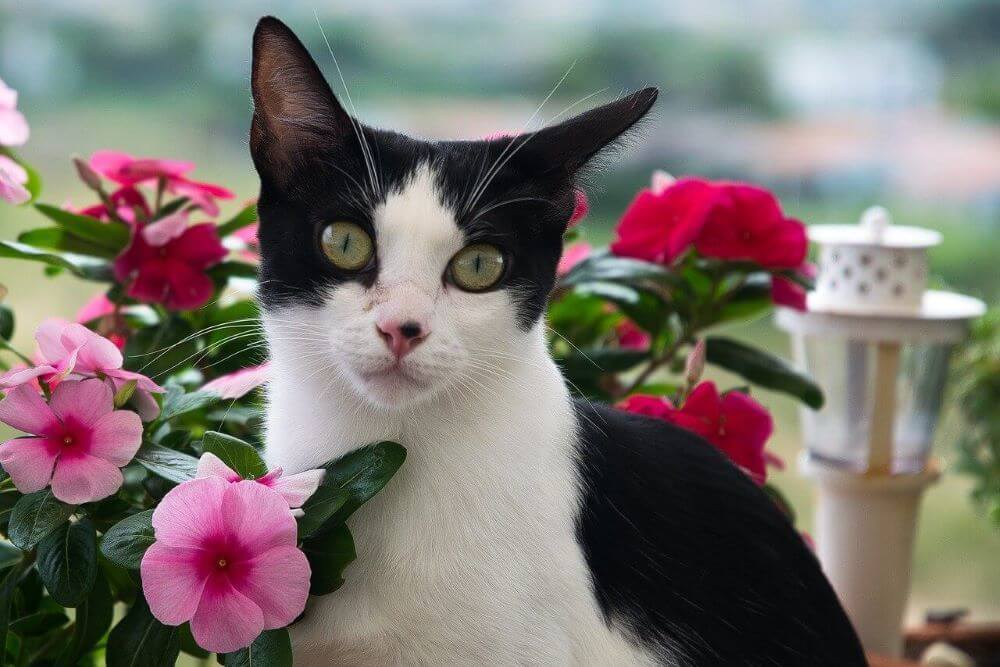
Some cat like to bat at a plant’s flowers or leaves.
Insects are attracted to flowers because they’re brightly colored, but cats might be attracted to a plant’s appearance too. It might look exciting enough to need a closer inspection from your kitty!
Also Read: 10 Toxic & Poisonous Plants For Cats
5. Shade Or Camouflage
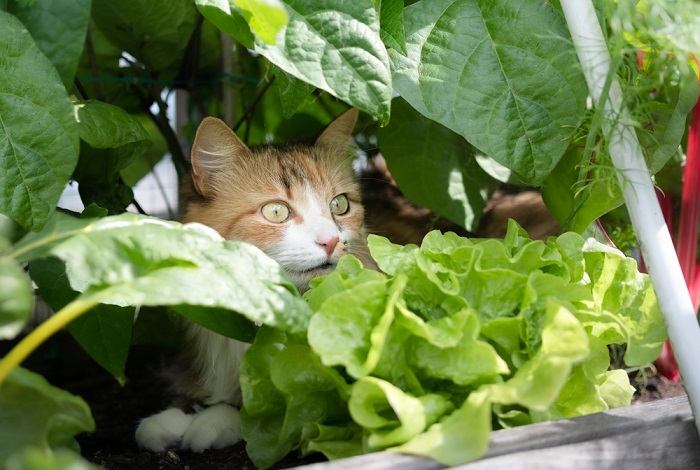
Especially outdoors, cat might enjoy hiding inside the leaves of a large plant.
Plants with large leaves or lots of foliage might provide much-needed shade for your cat on warm days. They might also be the perfect spot for hiding from predators, other cats, or inquisitive little humans. Cats might also find that certain plants give them plenty of privacy for pooping, like the perfect outdoor litter box!
Also Read: How To Keep Cats Cool In Summer
Why Might You Want To Keep Your Cat Away From Plants?
So, if your cat enjoys spending time in the garden with your plants, or likes to chew on your houseplants, why would you want to stop them?
1. They’re Toxic
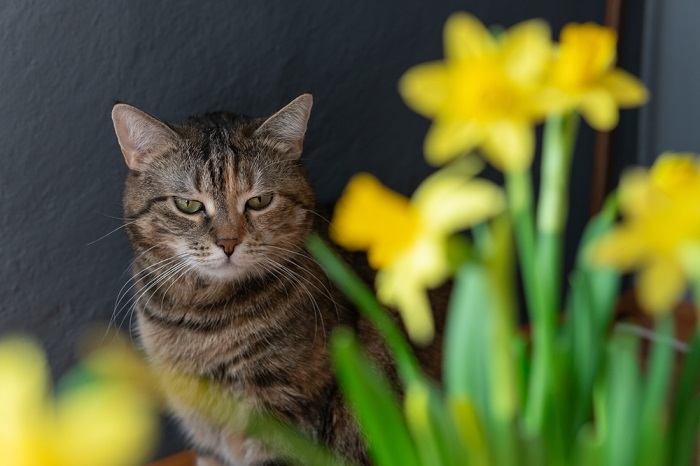
Daffodils are just one of the many plant species that are toxic to cats.
Not all plants are safe for your feline family members. Plants that are toxic to cats include the autumn crocus, various lilies, azaleas, rhododendrons, dieffenbachia, daffodils, and tulips.
However, there are many more examples and it’s worth making sure that plants and flowers are pet-safe before planting them in your garden or displaying them in your home.
Toxic plants can cause a range of symptoms in your cat, from vomiting and diarrhea to seizures. If you think your cat might have got hold of a toxic plant, you should speak to your veterinarian urgently.
Also Read: Poisoning In Cats: Causes, Symptoms, and Treatment
2. You’re A Keen Gardener
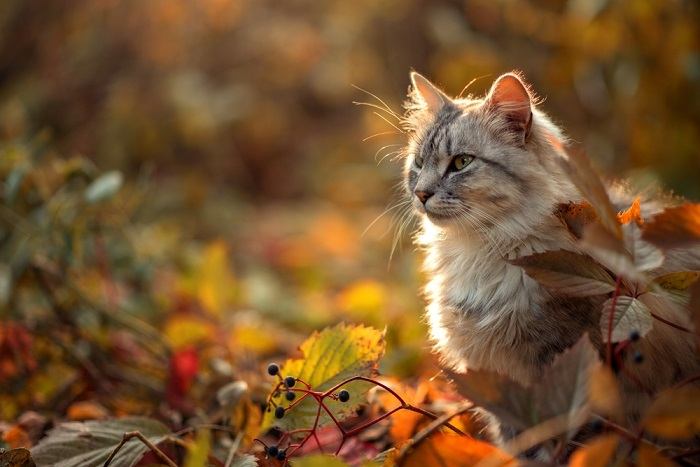
Even if none of your plants are toxic, cats can do a lot of damage rummaging around in your garden.
If you take pride in your garden or have green fingers, you probably don’t appreciate your cat spoiling your handiwork!
Whether they’re inadvertently digging up your spring bulbs while finding a place to poop, or they’re chewing on the leaves of your favorite flowering plant, you might find yourself trying to find ways to deter them.
Also Read: My Cat Doesn’t Finish Pooping In Litter Box: Is This Normal?
3. It’s Not Your Cat!
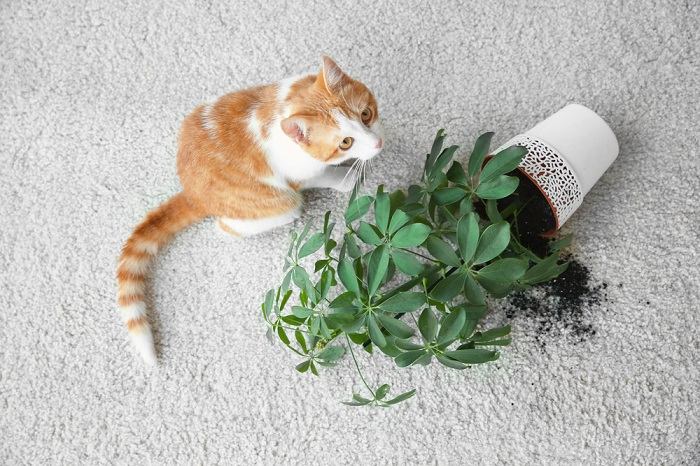
It’s harder to forgive a garden-wrecking cat that isn’t your own.
It might be a bit irritating if other people’s cats come into your garden and cause some mischief. However, try not to take it too personally. Exploring their surroundings is normal cat behavior, and cats don’t understand the concept of people’s property.
Also Read: Why Do Cats Knock Things Over?
How Do You Keep Cats Away From Your Plants and Out of Your Garden?
If you’re worried about keeping your cat safe around your plants, there’s no fail-safe technique aside from removing any potentially toxic plants.
However, if your plants are nontoxic to cats and you’re purely looking for a safe, non-harmful way to deter cats from destroying your blooms, there are a few options. Perhaps you’ve heard of some of the following cat deterrents? But are they safe and do they work?
1. Noise Deterrents
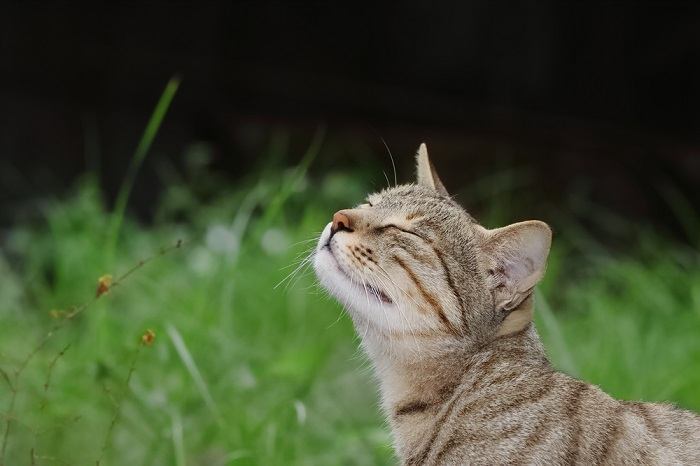
Devices that emit a high-pitched noise might work to keep cats out of your garden.
There’s a certain frequency of sound that cats and dogs really dislike. If you use an anti-cat device to keep cats out of your garden, you might find it emits a high-pitched noise as a deterrent. In an ideal world, the noise would be too high-pitched for human ears, but some people, especially youngsters, tend to be able to hear it.
Also Read: 6 Reasons Your Cat Makes Weird Noises At Night
2. Reflective Objects
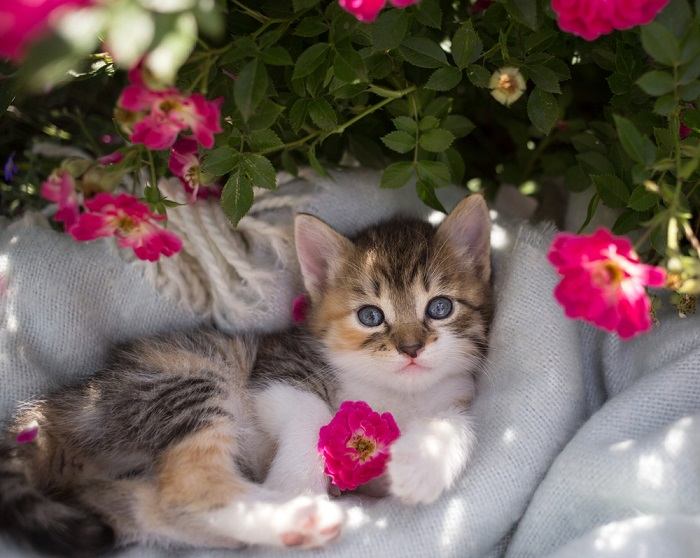
Hanging old CDs or aluminum foil can deter cats from entering your garden because they won’t like the bright, reflected light.
Have you ever heard of using old CDs to stop cats from going where you don’t want them? This trick relies on the fact that cats are deterred by reflected light. You can try hanging them around the flower beds but it’s best not to crush them because sharp shards could cause an injury to your poor kitty’s paws. Aluminum foil can also work and might be a little bit safer.
Also Read: Why Do Cats Like Crinkly Things? 6 Reasons Why!
3. Big Cat Poop
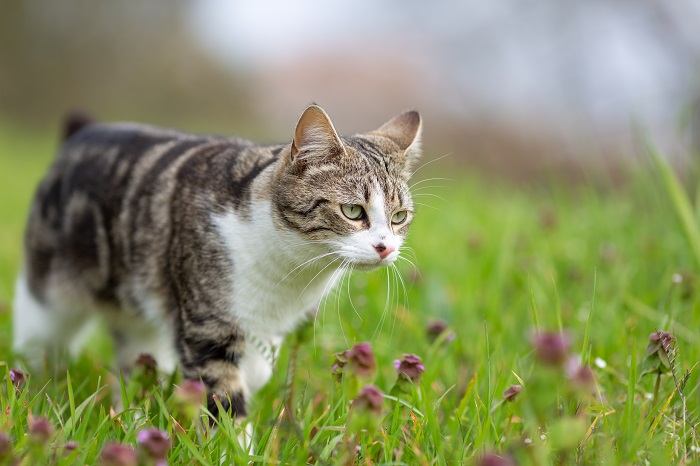
One theory states that placing lion manure in your garden might keep neighborhood cats out.
You might be aware of the theory that spreading lion poo around your garden stops unwanted feline visitors. The poop simulates territory marking and lets cats in the neighborhood know that a bigger cat has already claimed the area. It’s a great theory, but it has variable results in practice. If you want to try it, contact your local zoo or look online.
Also Read: 7 Similarities Between Domesticated Cats And Big Cats
4. Coffee Grounds

You might have heard that coffee grounds are safe to spread around your plants and the strong smell can be effective at keeping cats away. It’s true that cats find the smell offensive. However, coffee is toxic to cats if ingested, so this is not an appropriate method to keep cats out of your garden.
Also Read: Why Is My Cat Sniffing Everything All Of A Sudden?
5. Citrus

Cats dislike the scent of citrus so using peels or pieces of fruit in the garden might deter cats from entering.
Cats hate the smell of citrus fruits, so you could try placing slices of orange, lemon, or lime around your plants or use lemon juice in a spray bottle. Remember to test it on a small area of your plant first, though, in case it causes damage.
Also Read: Can Cats Eat Oranges?
6. Pepper

One whiff of cayenne and most cats will turn and head in the other direction.
Black pepper and cayenne pepper are great cat deterrents. Their spicy, overpowering smell is very unpleasant for cats. However, the smell doesn’t last long, so if you choose this method, you might find yourself reapplying the pepper frequently. It’s very unlikely that your cat will choose to eat or lick pepper but be aware that if they do it could give them an upset stomach.
Also Read: 120 Food Names For Cats
7. Mustard

Like pepper, cats are turned off by the strong smell of mustard.
Mustard powder works in a similar way to pepper, in that cats don’t like the strong smell. Mustard won’t harm your cat, but if they ingest it, it might give them a bout of vomiting or diarrhea.
8. Garlic Or Onions
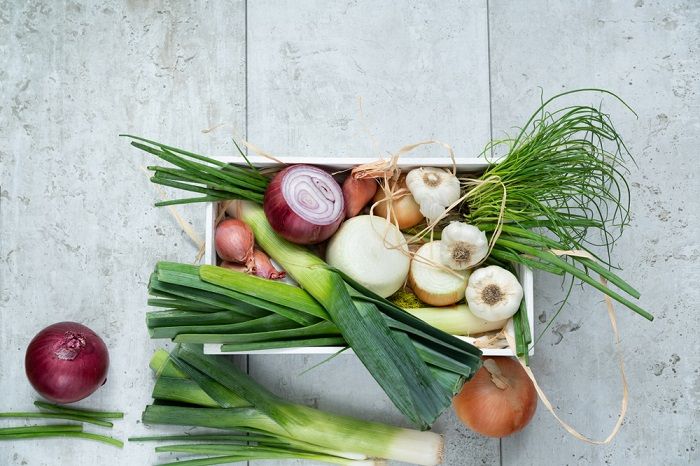
Don’t use onions or garlic as cat deterrents as these are poisonous to cats.
Many sources recommend using garlic or onions to keep cats away from your plants. However, garlic, onions, and other plants from the allium family are toxic to cats and dogs. Therefore, you should not use these methods.
Also Read: 5 Vegetables Cats Can Eat (And 5 To Avoid!)
9. Essential Oils
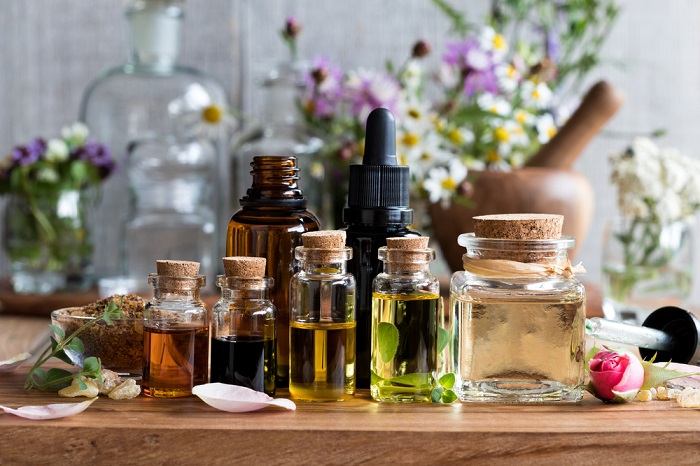
Although cats find the smell of many essential oils unpleasant, certain essential oils are toxic to cats, so don’t use them to keep your garden free from cats.
Essential oils, by nature, smell very strongly. Most cats give anything sprayed with essential oils a wide berth. However, many essential oils are toxic to cats, so it’s best not to use them at all. You can find more information about essential oils and cats here.
Also Read: Are Humidifiers Good For Cats?
10. Herbs
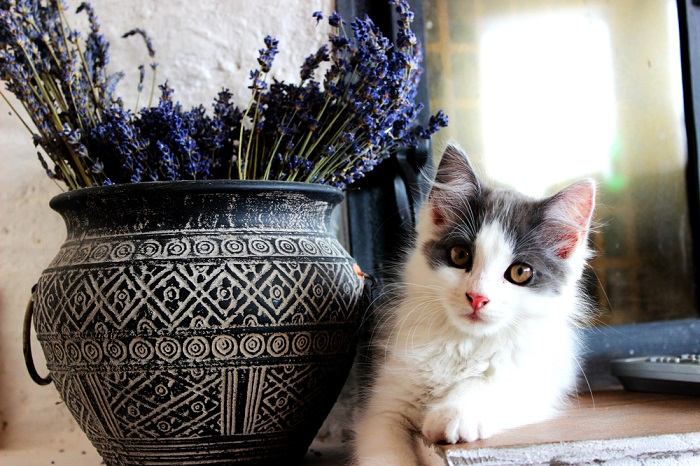
Cats find the smell of certain herbs offensive and will avoid gardens with these plants.
Strong-smelling herbs like rosemary, lavender, and lemon thyme are a safe cat deterrent. They might even be effective if you plant them amongst your flowers. Or you could make your own repellent spray by mixing the crushed leaves with water.
Also Read: Can Cats Eat Basil?
What Else Can You Try?
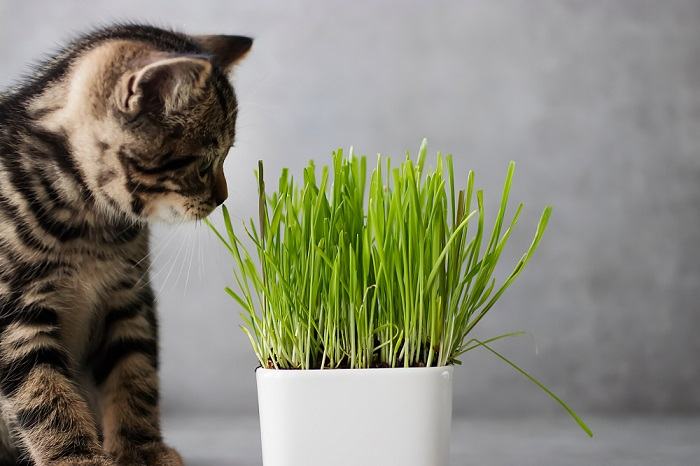
Cat grass is a safe plant for your cat to nibble on.
Keeping your cat busy with other things, like toys, or puzzle feeders might help to keep them away from your plant pots. You might also find that redirecting them to more cat-appropriate plants like a planter full of cat grass or catnip will help.
Also Read: The 10 Best Cat Slow Feeders & Puzzle Feeders
Final Thoughts
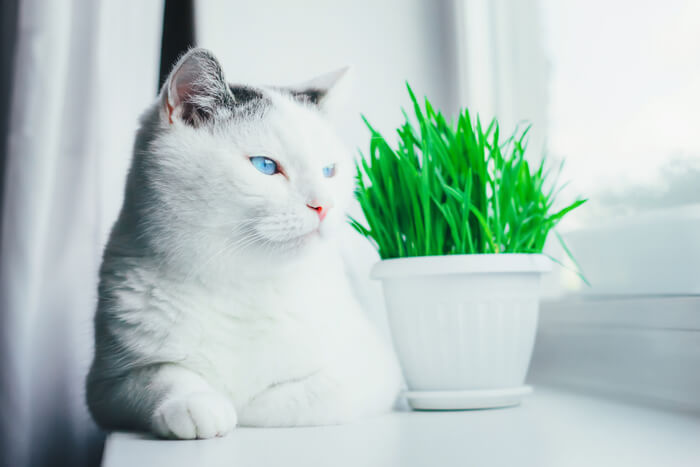
You can try several methods to keep cats away from plants and out of your garden, but only use the ones that won’t cause any harm to cats.
Keeping your cat safe and protecting your plants from cats can be tricky. Thankfully, there are some safe ways to keep your cat away from your plants that can be quite effective. On the other hand, it’s never worth the risk of having toxic plants around your cat. So, speak to your veterinarian if you’re unsure whether your garden poses a risk to your cat.
Also Read: List of Foods Cats Can and Cannot Eat
